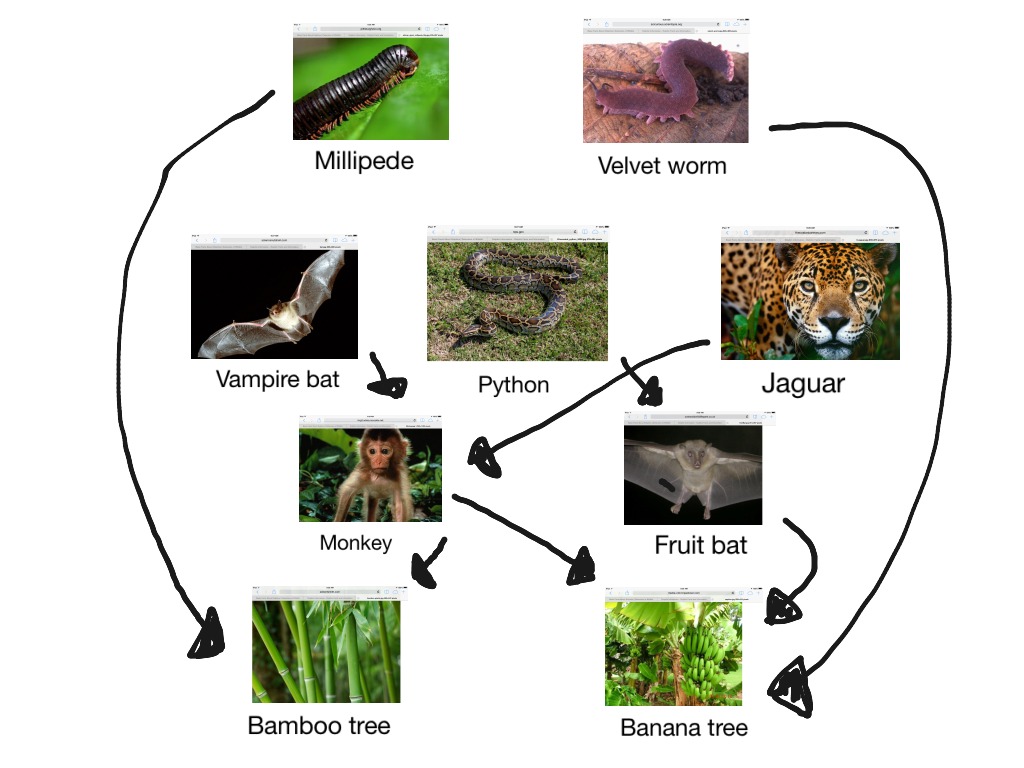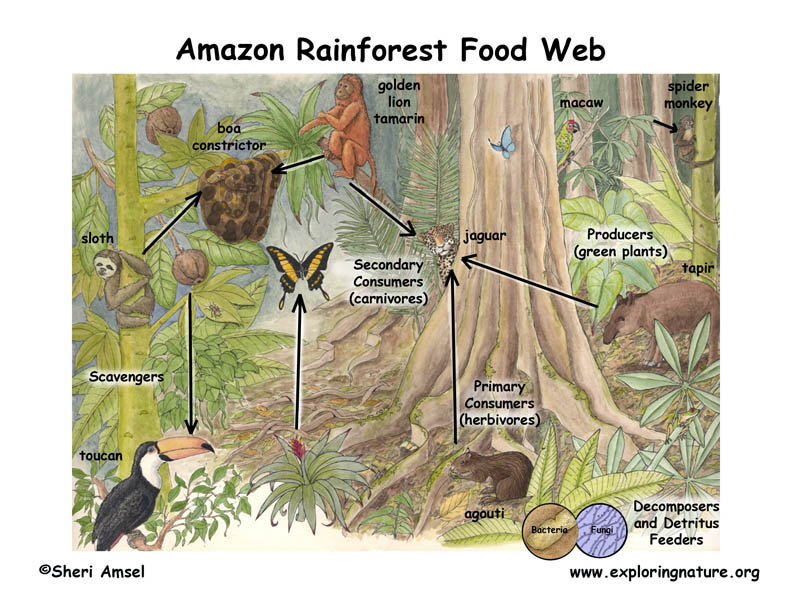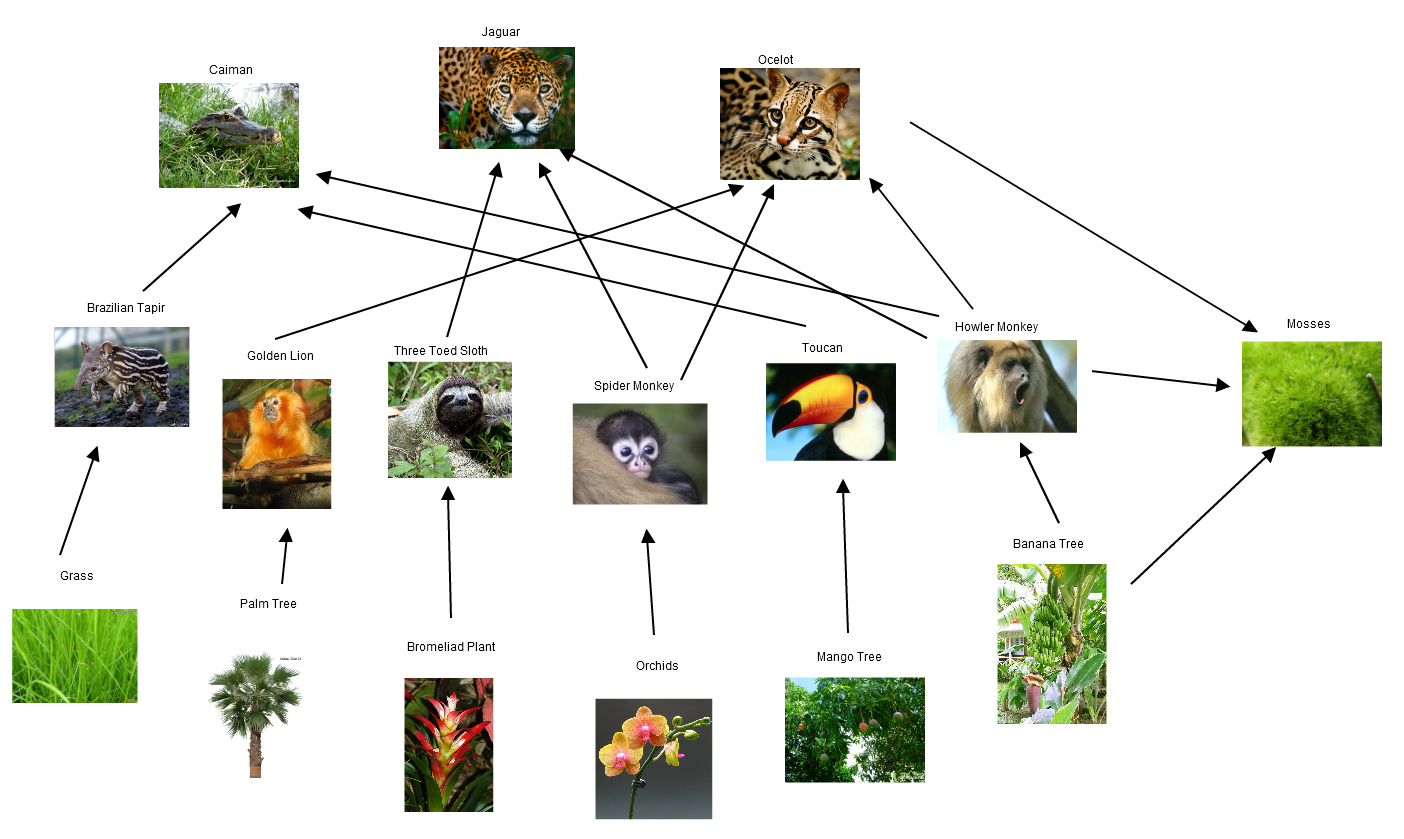Meals net of rainforest – Meals Net of the Rainforest: Dive into the fascinating tapestry of life throughout the lush rainforests, the place intricate connections and dependencies form the very essence of survival. From the tiniest decomposers to the majestic apex predators, every organism performs an important function in sustaining the fragile steadiness of this vibrant ecosystem.
On this exploration, we’ll unravel the complexities of the rainforest meals net, analyzing the interconnectedness of trophic ranges and the diversifications that enable organisms to thrive on this verdant realm.
Main Producers: Meals Net Of Rainforest

Main producers type the muse of the rainforest meals net, changing daylight into vitality by way of photosynthesis. This course of helps the whole ecosystem by offering the first supply of vitamins and vitality for all different organisms.
The primary major producers in a rainforest are vegetation, algae, and sure micro organism. Vegetation are probably the most ample and various major producers, with timber, shrubs, and vines dominating the cover and understory. Algae are present in each aquatic and terrestrial environments, whereas micro organism play a vital function in nutrient biking and decomposition.
Diversifications of Main Producers
Rainforest major producers have developed particular diversifications to thrive within the distinctive situations of the rainforest, together with:
- Broad leaves:Giant, broad leaves maximize daylight absorption for photosynthesis.
- Waxy cuticles:Waxy coatings on leaves scale back water loss by way of transpiration.
- Buttress roots:Vast, spreading roots present stability in shallow, nutrient-poor soil.
li> Epiphytes:Vegetation that develop on different vegetation, using daylight and moisture with out competing for soil vitamins.
Main Shoppers
Main shoppers, also referred to as herbivores, type the muse of the rainforest meals net by consuming major producers, corresponding to vegetation and algae.
The range of major shoppers in a rainforest is astounding, starting from tiny bugs to giant mammals. Every species has developed distinctive feeding methods and ecological niches to take advantage of completely different plant assets.
Feeding Methods and Ecological Niches
Main shoppers make use of a variety of feeding methods to entry plant materials. Some, like leaf-cutter ants, focus on chopping and transporting leaves again to their colonies, the place they domesticate fungus gardens as their major meals supply.
Others, corresponding to howler monkeys, are arboreal herbivores that feed on leaves, fruits, and flowers excessive within the cover. Their giant measurement and prehensile tails enable them to navigate the advanced rainforest construction and entry meals sources inaccessible to smaller animals.
Significance of Herbivory
Herbivory performs a vital function in sustaining the steadiness and variety of rainforest ecosystems. By consuming vegetation, major shoppers regulate plant populations, stopping anybody species from dominating and inhibiting the expansion of others.
Herbivory additionally shapes plant communities by selectively grazing on sure species, influencing plant succession and making a mosaic of habitats that assist a variety of species.
Secondary Shoppers
Secondary shoppers in a rainforest meals net occupy a vital place, bridging the hole between major shoppers and high predators. They play a big function in sustaining the fragile steadiness of the ecosystem.
Secondary shoppers might be broadly categorised into two teams: predators and scavengers. Predators actively hunt and kill their prey, whereas scavengers feed on the stays of animals which have died from different causes.
Predators
- Predators embody a various array of animals, corresponding to carnivorous mammals (e.g., jaguars, ocelots), reptiles (e.g., snakes, crocodiles), and birds (e.g., hawks, eagles).
- Predators play a crucial function in regulating populations of major shoppers, stopping their numbers from spiraling uncontrolled.
- They possess diversifications that improve their searching skills, corresponding to sharp claws, highly effective jaws, and eager senses.
Scavengers, Meals net of rainforest
- Scavengers embody animals like vultures, hyenas, and sure bugs.
- They feed on carcasses and decaying matter, serving to to wash up the ecosystem and forestall the unfold of illness.
- Scavengers have tailored to their scavenging way of life, possessing eager senses of odor and sharp beaks or tooth for tearing by way of flesh.
Tertiary Shoppers

Tertiary shoppers occupy the best trophic stage in a rainforest meals net, also known as apex predators. These formidable hunters are on the pinnacle of the ecosystem’s meals chain, preying upon secondary shoppers and infrequently major shoppers.
The presence of apex predators is essential for sustaining a balanced rainforest ecosystem. They exert top-down management over decrease trophic ranges, stopping overpopulation of prey species. This, in flip, permits for the preservation of plant range and the general stability of the rainforest habitat.
Threats Confronted by Tertiary Shoppers
- Habitat loss:Deforestation and fragmentation of rainforests scale back the obtainable habitat for tertiary shoppers, making it tough for them to seek out meals and shelter.
- Searching:Tertiary shoppers are sometimes focused by people for sport searching or for his or her fur, pores and skin, or different physique components.
- Air pollution:Contaminants from industrial actions and agricultural runoff can accumulate within the meals chain, poisoning tertiary shoppers.
- Local weather change:Rising temperatures and altered precipitation patterns can have an effect on the provision of prey species, making it difficult for tertiary shoppers to outlive.
Decomposers

Decomposers play a vital function within the rainforest ecosystem, breaking down lifeless natural matter and returning vitamins to the soil. These organisms embody micro organism, fungi, and invertebrates, corresponding to termites and earthworms.
Decomposers provoke the method of nutrient biking, changing natural matter into inorganic types that may be utilized by vegetation. This course of ensures the continual availability of important vitamins for plant development and ecosystem productiveness.
Diversifications of Decomposers
Decomposers have developed particular diversifications to effectively break down natural matter. These diversifications embody:
- Enzyme manufacturing:Decomposers produce enzymes that break down advanced natural compounds into less complicated molecules.
- Acid secretion:Some decomposers secrete acids to dissolve natural matter and facilitate its decomposition.
- Symbiotic relationships:Sure decomposers type symbiotic relationships with different organisms, corresponding to fungi with vegetation (mycorrhizae), to reinforce nutrient acquisition and decomposition.
- Tolerance to harsh situations:Decomposers usually thrive in nutrient-poor and acidic environments, the place different organisms wrestle to outlive.
Meals Net Dynamics
Rainforest meals webs are continually altering because of quite a lot of environmental components. These components can embody modifications in local weather, habitat loss, and the introduction of invasive species.Local weather change can have a big influence on rainforest meals webs. For instance, modifications in temperature and precipitation can have an effect on the distribution and abundance of vegetation and animals.
This could in flip have an effect on the meals sources for different animals, resulting in modifications in the whole meals net.
Conservation Implications
Rainforest meals webs are essential for the steadiness and well being of the ecosystem. Conserving these meals webs is important to keep up biodiversity, ecosystem providers, and the general well-being of the planet.Threats to rainforest meals webs embody deforestation, habitat loss, air pollution, local weather change, and overexploitation.
Deforestation and habitat loss fragment and destroy habitats, disrupting the move of vitality and vitamins by way of the meals net. Air pollution can accumulate in organisms, affecting their well being and reproductive success. Local weather change alters species’ distributions and interactions, resulting in disruptions within the meals net.
Overexploitation of species, corresponding to searching and logging, can deplete populations and disrupt the steadiness of the ecosystem.Conservation methods for shielding rainforest meals webs embody:
Establishing protected areas and decreasing deforestation
Establishing nationwide parks, reserves, and different protected areas helps protect rainforest habitats and scale back human impacts. Decreasing deforestation by way of sustainable land administration practices and reforestation efforts can be essential.
Controlling air pollution
Implementing laws and selling sustainable practices to scale back air pollution from industrial actions, agriculture, and transportation helps shield rainforest ecosystems and the species they assist.
Mitigating local weather change
Taking motion to scale back greenhouse fuel emissions and mitigate the results of local weather change is important to guard rainforest meals webs and the planet as an entire.
Sustainable harvesting and wildlife administration
Implementing sustainable harvesting practices and wildlife administration plans helps forestall overexploitation of species and keep the steadiness of the ecosystem.
Schooling and consciousness
Elevating consciousness in regards to the significance of rainforest meals webs and selling accountable habits can assist shield these ecosystems and the species they assist.
Generally Requested Questions
What’s the significance of major producers within the rainforest meals net?
Main producers, corresponding to vegetation, are the muse of the rainforest meals net, changing daylight into vitality by way of photosynthesis, which helps all different trophic ranges.
How do secondary shoppers contribute to the steadiness of the rainforest ecosystem?
Secondary shoppers, together with predators and scavengers, play a vital function in regulating populations, stopping overpopulation and sustaining a wholesome steadiness amongst species.
What are the diversifications that allow decomposers to thrive within the rainforest setting?
Decomposers have developed specialised enzymes and symbiotic relationships to interrupt down advanced natural matter effectively, contributing to nutrient biking and supporting the expansion of major producers.



